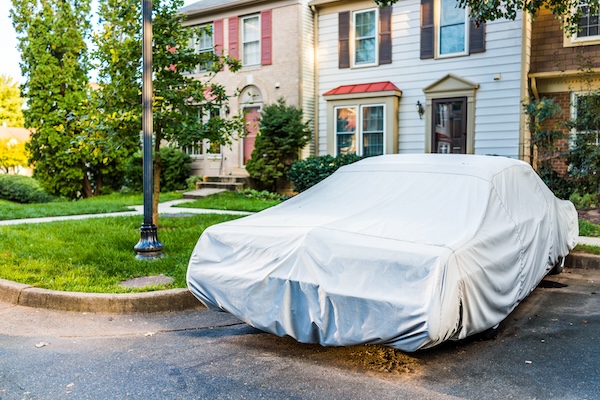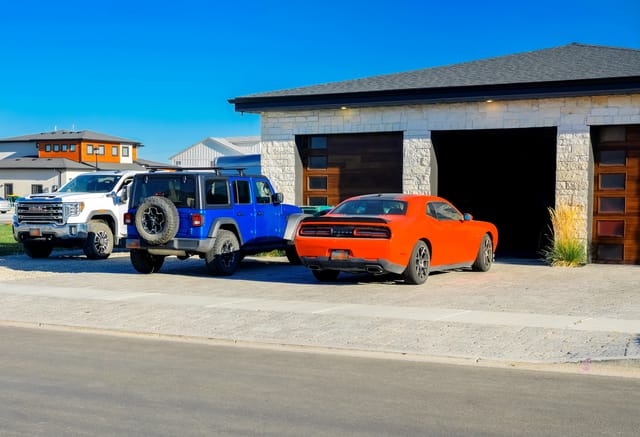What renters in American Fork say
4.0
(64)
Verified reviews
The Neighbor rating for car storage hosts in American Fork is a rating based on verified reviews from our comunity of renters who have booked with these hosts to meet their parking and storage needs. Last updated March 2025
Cheap prices: Starting at $37
Average price for car storage is $44 with first month discounts available.
Parking Garage is the most common space type, measuring 12 feet by 15 feet.
Host response time averages 12 minutes for available car storage options.
Indoor or covered parking spaces
Average price for indoor covered storage is $64 per month.
Over 50% of locations offer business hours access.
Average space dimensions are 14 feet by 15 feet.
Top-rated: 4+ star reviews
Average price of top rated car storage is $130 with 44 ratings of locations.
All car storage options offer camera features for added security.
Response time from hosts is within 24 hours for all listings.
Parking for multiple vehicles
Average price for multiple vehicle storage is $66 per month.
50% of locations offer business hours access for convenience.
Average host response time is within 24 minutes for quick assistance.
Closest units to my location
Average distance to car storage is 1.7 miles from your location.
1.9 miles is the median distance for available storage options.
Fast response time averages within 24 hours for nearby hosts.
Search your zip code:
- 84003
Large vehicles (SUVs, trucks, vans)
Average price for large vehicle storage is $66 per month.
Driveway options average 14 feet wide, great for trucks and vans.
50% of locations offer business hours access for convenience.
Premium spaces & services
Average price of premium storage is $135 with sizes up to 36 feet.
100% of premium spaces feature security cameras for added protection.
Average response time is within 24 hours for all premium listings.
Climate controlled storage
Average cost for climate controlled garages is $63 per month.
Garage spaces average 18 feet in length and 15 feet in width.
Top hosts respond in 11 minutes or less for climate controlled options.
Vehicle storage size estimator
Enter your car information below to see what size storage unit you need for your car.
Recommended storage options by car type
Compact car
10’×15’ storage units
Due to their small size, mini cars can fit in an indoor or outdoor 10’×15’ space. Car examples include Mini Cooper (12.6 feet) and Mazda Miata (12.10 feet).
Small car
10’×15’ storage units
Small car examples include Honda Fit (13.3 feet), Volkswagen Golf (13.8 feet), Kia Soul (13.9 feet), and Kia Rio Hatchback (13.4 feet).
Small SUV
10’×15’ storage units
Small SUVs can be stored indoor, outdoor, and covered spaces. The Toyota Corolla iM (14.2 feet) and Honda CR-V are car examples.
Mid-size car
10’×15’ storage units
Mid-size cars are the largest cars that fit in a 10’×15’ space. Examples include Ford Fiesta (14.5 feet), and Ford Focus (14.4 feet).
Full-size car
10’×20’ storage units
Full-sized cars include Toyota Camry (16.2 feet), Honda Civic (15.27 feet), Ford Fusion (15.9 feet), and Chevrolet Impala (16.7 feet).
Small pickup
10’×20’ storage units
Small pickups can be stored uncovered and outdoor. If storing indoor, make sure the height of the car will work. Toyota Tacoma (17.6 feet) is a small pickup.
Mid-size to large SUV
10’×20’ storage units
Larger SUVs requiring a 10’×20’ unit include Jeep Grand Cherokee (16.13 feet), Toyota RAV4 (15.1 feet), GMC Sierra (19.1 feet), and Ford Explorer (16.5 feet).
Minivan
10’×20’ storage units
Minivans typically fit well in a 10’×20’ unit. For more room, store in a 10’×30’. Car examples include Honda Odyssey (17.1 feet) and Toyota Sienna (16.9 inches).
Large pickup
10’×30’ storage units
Large pickup 10’×30’ storage units Pickup trucks can be store indoor or outdoor. Examples include Chevrolet Silverado (19.4 feet), Ford F-150 (18.97 feet), and the rest of the Ford-F series (20.85 feet).
Deciding what kind of storage is best for you
Seasonal car storage
Choose indoor storage (garage or facility) for protection, or secure outdoor storage with a cover. Maintain battery and tires.
Storing a car while in a large city
Use a secure parking garage, consider car storage services, or park in well-lit areas with anti-theft devices.
Military deployment car storage
Select a long-term storage facility with monitoring, trust friends or family, or consider renting it out for extra use.
Storing a business car or truck
Opt for commercial storage facilities, use on-site storage if available, and perform maintenance pre-storage.
Auto storage during a life change
Options include long-term storage facilities, trusted contacts (friends or family), or renting out the car for extra use.
Parking a car when you travel
Consider airport parking, storage facilities, or car storage services. Ensure your car is well-maintained before departure.

Can’t find what you’re looking for?
Search the nation’s largest storage marketplace to find cheap car storage near you.
See more car storageTips to prepare your car for storage
Properly preparing a car for short- or long-term storage prevents damage, maintains its value, saves on costs and makes pick-up easier
Vehicle Parking and Storage in American Fork, UT
Select storage type
Explore car storage in American Fork, Utah
Additional Utah car storage locations
Alternative Car Storage Facilities near American Fork
Neighbor is the largest storage and parking marketplace in the U.S., making it easy to compare trusted facilities and neighborhood options in American Fork. Below are more storage facilities in your area you might like.
Need car storage in American Fork?
Neighbor is the world’s largest parking marketplace. Call for rates or search online for the cheapest, closest, and safest parking spaces.
(844) 449-1099





























































































